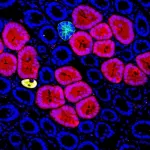Clinical trial launched following discovery that psychiatric drug may prevent bowel cancer
2021-06-02
(Press-News.org) The study, published in the journal Nature, shows how a drug available on the NHS can boost fitness of healthy stem cells in the gut, making them more resistant to sabotage from mutant stem cells that cause cancer.
Researchers in the Netherlands, funded by the UK charity Worldwide Cancer Research, have discovered a way to boost the fitness of healthy cells in the gut to prevent the development of bowel cancer. The findings have led to the initiation of a clinical trial to find out if a commonly used psychiatric drug could be used to prevent bowel cancer in people. The trial will recruit patients with a genetic mutation that means they are virtually 100% certain to develop bowel cancer in their lifetime, unless the entire large bowel is removed.
Bowel cancer affects more than 43,000 people each year in the UK and just over half of the people diagnosed survive their disease for 10 years or longer. It is thought that the majority of bowel cancer cases are caused by mutations in a gene called APC.
Intestinal stem cells with mutations to the APC gene have been shown to have a competitive advantage over their healthy counterparts and frequently outcompete them, leading to unrestricted growth and cancer.
Up until now it was unclear how the mutant stem cells win the upper hand, but new research, published in the journal Nature, now shows that the mutant stem cells actively emit signals that sabotage the function of healthy stem cells in the gut.
Professor Louis Vermeulen, Group Leader at the Centre for Experimental Molecular Medicine at Amsterdam UMC, and senior author of the paper explained: "We have uncovered the very first steps in the development of bowel cancer. We found that following the occurrence of a mutation in a key gene that regulates stem cells in the intestine, these cells turn into cheaters that actively suppress the normal cells in the environment.
"This is a totally new concept as it was always thought that mutant cells that can turn into cancer simply proliferate faster or are resistant to cell death. But our findings indicate that cells on their way to a full malignancy can actively suppress the stem cells in the vicinity to gain a competitive edge. This is a concept we refer to as supercompetition."
Critically, the researchers also discovered a way to prevent the mutant stem cells from interfering with the healthy ones. Lithium, a commonly used drug for the treatment of several psychiatric disorders, prevented the mutant stem cells from taking over and forming tumours in mice by rendering the healthy stem cells insensitive to the damaging signals.
A clinical trial funded by the Dutch Cancer Society (KWF) testing the effect of lithium of bowel cancer development in individuals with familial adenomatous polyposis (FAP) will now be performed in the Netherlands. FAP is a relatively uncommon genetic syndrome that affects about 1 in 7,000 to 1 in 22,000 people. FAP patients have mutations in their APC gene and develop hundreds of non-cancerous polyps and adenomas in their bowel. Without treatment nearly all of them will develop bowel cancer between the ages of 35 and 45.
The trial is set to recruit 10 young adult patients with FAP and will observe the patients before, during and after treatment with lithium for a total of 18 months. The researchers will collect evidence on the preventive effect of lithium on mutant stem cells and polyp formation, as well as test the safety profile of lithium. Results of the clinical trial are likely to build the basis for larger trials with more patients.
Sanne van Neerven, PhD student who conducted the research, said: "Our clinical trial may reveal that lithium can be used to prevent cancer development in FAP individuals. But what is also important is that this trial can establish a proof of concept that manipulating competition between mutant cells and normal cells can be manipulated in such a way that the healthy cell outcompete the mutant cells. This is a novel strategy for cancer prevention and could be applied to many heritable cancer syndromes involving different mutations and organs, but more research is warranted in this area."
Dr Helen Rippon, Chief Executive at Worldwide Cancer Research said: "The discoveries made by Professor Vermeulen and his team are a huge breakthrough in our understanding of how bowel cancer develops. It's amazing to see innovative research like this go from the lab to the clinic as it shows just how important early-stage discovery research is to starting new cancer cures. We are all very excited to see the results from this clinical trial and the future impact these findings might have on other people with inherited cancer syndromes.
"Around 1% of bowel cancers are caused by familial adenomatous polyposis (FAP). This may seem like a small number, but in the UK alone this means that over 400 people are diagnosed with bowel cancer caused by FAP every year. The only treatment option available for people with FAP is major surgery to remove the entire colon, which can be life altering and unfortunately cannot guarantee that cancer won't develop. The launch of a clinical trial thanks to this incredible research will offer real hope to people that there could be a simple way to prevent bowel cancer in the future."
INFORMATION:
For more information about Worldwide Cancer Research, please visit: https://www.worldwidecancerresearch.org/.
ELSE PRESS RELEASES FROM THIS DATE:
2021-06-02
Metastases can develop in the body even years after apparently successful cancer treatment. They originate from cancer cells that migrated from the original tumor to other organs, and which can lie there inactive for a considerable time. Researchers have now discovered how these "sleeping cells" are kept dormant and how they wake up and form fatal metastases. They have reported their findings in the journal Nature.
A tumor can leave behind an ominous legacy in the body: cancer cells can migrate from the tumor to other tissues in the body, where they survive after treatment in a kind of hibernation called dormancy. Currently, cancer medicine relies on monitoring cancer patients ...
2021-06-02
Studies on cancer are limited by the threshold at which cellular transformations become clinically detectable. However, the very initial phase on the way to malignancy is histologically invisible, as the process originates from one single cell. In this early phase, a so-called "seeding cell" acquires an initial pro-cancerous mutation, also known as the "first oncogenic hit", while being completely surrounded by normal tissue. To overcome the detection barrier, a team of researchers around IMBA group leader Bon-Kyoung Koo and University of Cambridge group leader Professor Benjamin D. Simons developed a laboratory system to dissect the pre-cancerous steps that remained under the radar ...
2021-06-02
A team of researchers led by the University of Cambridge and University of Utrecht examined trends in daily crime counts before and after COVID-19 restrictions were implemented in major metropolitan areas such as Barcelona, Chicago, Sao Paulo, Tel Aviv, Brisbane and London.
While both stringency of lockdowns and the resulting crime reductions varied considerably from city to city, the researchers found that most types of crime - with the key exception of homicide - fell significantly in the study sites.
Across all 27 cities, daily assaults fell ...
2021-06-02
Clinical trials published in high-profile medical journals rarely report on income or other key sociodemographic characteristics of study participants, according to a new study that suggests these gaps may create blind spots when it comes to health care, especially for disadvantaged populations.
The study, publishing June 2 in JAMA Network Open, analyzed 10 per cent of 2,351 randomized clinical trials published in New England Journal of Medicine, JAMA, The BMJ, The Lancet and Annals of Internal Medicine between Jan. 1, 2014 and July 31, 2020.
The most commonly reported sociodemographic variables were sex and gender (in 98.7 per cent of trials) and race/ethnicity (in 48.5 per cent). All other sociodemographic ...
2021-06-02
Experts at the Alfred Wegener Institute have, for the first time, experimentally measured the release of iron from the fecal pellets of krill and salps under natural conditions and tested its bioavailability using a natural community of microalgae in the Southern Ocean. In comparison to the fecal pellets of krill, Antarctic phytoplankton can more easily take up the micronutrient iron from those produced by salps. Observations made over the past 20 years show that, as a result of climate change, Antarctic krill are increasingly being supplanted by salps in the Southern Ocean. In the future, salps could more effectively stimulate the fixation of the greenhouse gas carbon dioxide in Antarctic microalgae than krill, as the team of researchers report ...
2021-06-02
Peer reviewed
Experimental study / Meta-analysis
Animals / Human data
Protein disguise could be new target for cancer immunotherapy
Researchers at the Francis Crick Institute have identified a protein that helps tumours evade the immune system and, in certain types of cancers, is linked to a poorer chance of survival. The protein could become a target for future cancer treatments.
A crucial part of the immune system's response to cancer is a group of white blood cells, called CD8+ T-cells, which kill tumour cells. Before they launch their anti-tumour response, these cells must be told who to attack by another immune cell, ...
2021-06-02
They studied the extent to which cirrus clouds caused by aircraft occurred during the global hard lockdown between March and May 2020, and compared the values with those during the same period in previous years. The study was led by Johannes Quaas, Professor of Theoretical Meteorology at Leipzig University, and has now been published in the renowned journal "Environmental Research Letters".
Cirrus clouds, known for their high, wispy strands, contribute to warming the climate. When cirrus clouds occur naturally, large ice crystals form at an altitude of about 36 kilometres, in turn reflecting sunlight back into space - albeit ...
2021-06-02
What drives the feasibility of climate scenarios commonly reviewed by organizations like the Intergovernmental Panel on Climate Change (IPCC)? And can they actually be achieved in practice? A new systematic framework can help understand what to improve in the next generation of scenarios and explore how to make ambitious emission reductions possible by strengthening enabling conditions.
While the IPCC is in the midst of the drafting cycle of the Sixth Assessment Report, whose publication will start in the second half of 2021, there is an ongoing debate ...
2021-06-02
ITHACA, N.Y. - Influencing millions of people on social media and being paid handsomely is not as easy as it looks, according to new Cornell University research.
Algorithm vagaries are just one of several challenges social media content creators face, according to study author Brooke Erin Duffy, associate professor of communication at Cornell.
"I think [our research] is a cautionary tale for aspiring creators as well as the broader public," Duffy said. "The people hoping to work as full-time YouTubers, Instagrammers, and TikTokers are led to believe it's easy and democratic. ...
2021-06-02
One-quarter of people who take the drug methotrexate for common immune system disorders -- from rheumatoid arthritis to multiple sclerosis -- mount a weaker immune response to a COVID-19 vaccine, a new study shows.
Published (online May 25) recently in Annals of the Rheumatic Diseases, the study addressed disorders that result when the immune system, meant to fight disease and drive healing, is triggered abnormally. This in turn causes inflammation, the pain and swelling that come as immune cells rush into damaged or infected tissue, but often in the wrong amount or context. Called immune-mediated inflammatory disorders, they are typically treated ...
LAST 30 PRESS RELEASES:
[Press-News.org] Clinical trial launched following discovery that psychiatric drug may prevent bowel cancer

